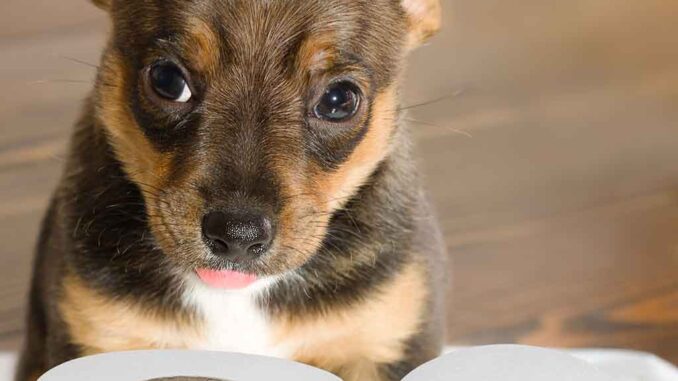
This article was updated on February 13th, 2024

As veterinarians, we see dogs with diarrhea every week. The color of your dog’s diarrhea is one of the first questions that we ask to help understand what is going on. Orange diarrhea can sometimes resolve on its own without any treatment. However, it can also be a symptom of life-threatening medical conditions such as liver or gallbladder disease.
In this article, our veterinarians Dr. Sara Ochoa & Dr. Chyrle Bonk explain the most likely causes and share 4 things you should know about orange diarrhea.
What It Looks Like
Orange diarrhea can range from a brownish orange to a very bright orange color. Many times, dogs with orange diarrhea will have a stool that is runny, mucousy, and has no shape or form, as seen on the picture below [Warning: Graphic Image!].
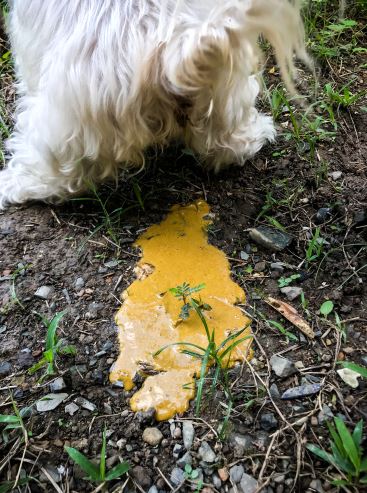
What Causes Orange Diarrhea?
1. Liver or Gall Bladder Issues.
The main cause of your dog having orange diarrhea is an issue with their liver or gall bladder.
When all is normal in a dog’s digestive tract, bile is released into the small intestine while the food exits the stomach. Bile is produced by the liver, stored in the gall bladder, and helps to further break down and digest food products. As the food products move through the intestines, that bile is resorbed, leaving its trademark brown color staining the feces. If bile isn’t released normally in the small intestine or if it isn’t resorbed properly, orange diarrhea can result.
Reasons that bile isn’t added to the food products are:
- Gall bladder inflammation or blockage
- Liver disease
Reasons bile isn’t absorbed include::
- Intestinal infection that affects absorption
- Inflammation of the intestine
If your dog has liver or gallbladder issues, you may also notice that your dog’s skin and the white part of the eye are a yellow color. Other issues you will see with dogs with liver and gallbladder disease are:
- Vomiting
- Not eating
- Lethargic
- Enlarged abdomen
Liver and gall bladder diseases can be life-threatening, and if you think that your dog may have issues with these organs, you should take your dog to your vet right away. They can run bloodwork to see what is causing your dog to be so sick and start them on medications to help.
2. Eating Orange Food
The other reason that your dog could possibly have orange diarrhea is that they ate something that is orange. Common foods that dogs will eat that are orange are:
- Carrots
- Sweet potatoes and
- Pumpkin
All of these foods, in high amounts, can cause your dog to have orange diarrhea. Dogs who ate orange foods will not show any other signs of illness, and this will easily clear up on its own.
3. Other Reasons
Some less common reasons for orange diarrhea in dogs is increased red blood cell destruction from an autoimmune or infectious disease. Hemoglobin, a component of red blood cells, is reddish-orange in color and can stain a dog’s diarrhea orange if in high levels in the waste product.
Five things to know if your dog has orange diarrhea (according to our veterinarians)
1. You don’t need to worry if this is your dog’s first orange stool and they’re acting normal
“If this is your dog’s first orange stools and he’s otherwise acting normal, feel free to wait until you witness another abnormal bowel movement before you take action. This is especially true in dogs that prefer to “taste” their world and aren’t afraid to put anything into their mouths or stomach (such as carrots or even an orange crayon!)”

Common foods that dogs will eat that are orange are:
- Carrots
- Sweet potatoes and
- Pumpkin
All of these foods, in high amounts, can cause your dog to have orange diarrhea. Dogs who ate orange foods will not show any other signs of illness, and this will easily clear up on its own.
2. Feed your dog a bland diet with probiotics
“If one of my dogs has more than one episode of diarrhea, I give probiotics for a couple of days. If the diarrhea continues and they are still eating, I start feeding a bland diet of chicken and rice in small amounts 3-4 times a day. If the diarrhea lasts longer than 2 days or if their signs get more severe, it’s time for a workup.”

Probiotics are a great way to restore the normal bacterial balance in your dog’s gut. These products or supplements contain healthy bacteria that are essential for recovery. One example is “Purina FortiFlora Probiotics for Dogs”:
- Number one probiotic supplement recommended by veterinarians (Kantar Veterinary Tracker, 2020)
Plain chicken, rice, pumpkin and white fish are all bland, easily digestible foods for dogs that shouldn’t cause any further harm to your dog’s gut. Learn about the best remedies to stop dog diarrhea.
3. Call your vet if your dog has a second bout or if the diarrhea lasts longer than 48 hours
“If a dog’s diarrhea lasts more than 48 hours, no matter the color, it’s typically cause for concern. Mild causes of diarrhea, such as eating something they shouldn’t have, usually clear up within that 48 hours, so by that three day mark, you’re probably looking at something a little more serious.”

This is even more true if your dog has other signs of illness, such as vomiting, lethargy, a fever, or abdominal pain. If your dog’s diarrhea lasts for more than two days, is getting worse, or is accompanied by other signs, see your veterinarian as soon as possible for a complete workup.
4. Repeated orange diarrhea may be due to serious health conditions (such as liver or gall bladder issues)
“The main cause of your dog having ongoing orange diarrhea is an issue with their liver or gall bladder. When all is normal in a dog’s digestive tract, bile is released into the small intestine. If bile isn’t released normally in the small intestine or if it isn’t resorbed properly, orange diarrhea can result.”

Signs of liver or gallbladder issues in dogs may include jaundice (yellowing of the eyes, gums, or skin), lack of appetite, vomiting, abdominal pain or enlarged abdomen, lethargy, weight loss, and increased thirst and urination (in addition to orange diarrhea). If you see any of these signs (or other signs of illness), prompt veterinary evaluation is crucial to find out how to start the right treatment quickly.
Dr. Ochoa explains why it’s important to monitor your dog closely: “Liver and gall bladder diseases can be life-threatening, and if you think that your dog may have issues with these organs, you should take your dog to your vet right away. They can run bloodwork to see what is causing your dog to be so sick and start them on medications to help.”
Diagnosis at the vet
At the clinic, your vet will perform an exam and other diagnostics of blood work, imaging, and fecal tests to pinpoint the exact cause. Bringing a fecal sample with you to the appointment can help identify the cause of the dog’s diarrhea and guide appropriate treatment.
Some causes of orange dog diarrhea may require a hospital stay or surgery. In case of any doubt, call your vet to get their advice.
Related posts:
 Dog With Diarrhea at Night: How to Stop Waking Up to A Mess - There’s never a great time for your dog to have diarrhea. But when they start having it at nighttime, it… [...]
Dog With Diarrhea at Night: How to Stop Waking Up to A Mess - There’s never a great time for your dog to have diarrhea. But when they start having it at nighttime, it… [...]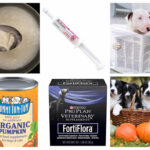 Stop Dog Diarrhea Fast with 7 Easy Home Remedies [Vet Advice] - At my clinic, I see dogs suffering from diarrhea on a daily basis. While some cases require veterinary intervention, there… [...]
Stop Dog Diarrhea Fast with 7 Easy Home Remedies [Vet Advice] - At my clinic, I see dogs suffering from diarrhea on a daily basis. While some cases require veterinary intervention, there… [...] When is Dog Diarrhea an Emergency? An Emergency Vet Explains - Diarrhea is one of the most common complaints that I face as an emergency veterinarian. Dogs are notorious for getting… [...]
When is Dog Diarrhea an Emergency? An Emergency Vet Explains - Diarrhea is one of the most common complaints that I face as an emergency veterinarian. Dogs are notorious for getting… [...] Dog Has Diarrhea for 2-3 Days: Four Tips from Our Vet - Every day I treat at least 3 to 5 dogs who are having diarrhea. There are many reasons why your… [...]
Dog Has Diarrhea for 2-3 Days: Four Tips from Our Vet - Every day I treat at least 3 to 5 dogs who are having diarrhea. There are many reasons why your… [...] Puppy Has Diarrhea But Still Playful: 4 Solutions From a Vet - Some puppies that I see will have diarrhea. Often these puppies are still very playful, eating and acting normal. These… [...]
Puppy Has Diarrhea But Still Playful: 4 Solutions From a Vet - Some puppies that I see will have diarrhea. Often these puppies are still very playful, eating and acting normal. These… [...] Dog Has Bloody Diarrhea but Acts Normal: Tips From Our Vet - The first instinct of any owner when they see blood in their dogs’ poop is to panic; blood is quite… [...]
Dog Has Bloody Diarrhea but Acts Normal: Tips From Our Vet - The first instinct of any owner when they see blood in their dogs’ poop is to panic; blood is quite… [...] How Much Pumpkin to Give a Dog with Diarrhea: Qty by Weight - In the world of superfoods, pumpkins rank high on the list. We humans eat pumpkins for their antioxidants, fiber, vitamins… [...]
How Much Pumpkin to Give a Dog with Diarrhea: Qty by Weight - In the world of superfoods, pumpkins rank high on the list. We humans eat pumpkins for their antioxidants, fiber, vitamins… [...] How Fast Does Pumpkin Help a Dog with Diarrhea? - Are you looking for a speedy remedy to help a dog with diarrhea? If your puppy or adult dog is… [...]
How Fast Does Pumpkin Help a Dog with Diarrhea? - Are you looking for a speedy remedy to help a dog with diarrhea? If your puppy or adult dog is… [...]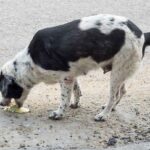 Dog Who Vomits and Has Diarrhea? Our Vet Shares 4 Tips - In our veterinarian clinic, it is typical for me to see at least 2 to 3 owners each day whose… [...]
Dog Who Vomits and Has Diarrhea? Our Vet Shares 4 Tips - In our veterinarian clinic, it is typical for me to see at least 2 to 3 owners each day whose… [...] Dog with Diarrhea But Acting Normal: Our Vet Shares 6 Things to Know - In my clinic, I see dogs suffering from diarrhea on a daily basis; some have no other signs of illness,… [...]
Dog with Diarrhea But Acting Normal: Our Vet Shares 6 Things to Know - In my clinic, I see dogs suffering from diarrhea on a daily basis; some have no other signs of illness,… [...]Disclaimer: This website's content is not a substitute for veterinary care. Always consult with your veterinarian for healthcare decisions. Read More.


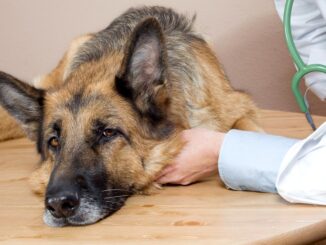

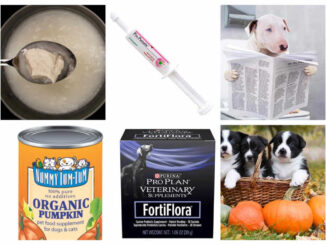
Be the first to comment